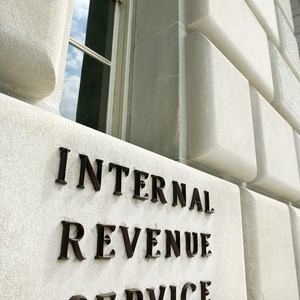
Federal tax law recognizes that people make honest mistakes when figuring out their taxes and allows for the filing of amended tax returns. If correcting your original return increases the amount of tax you owe, the Internal Revenue Service may charge you an amended return penalty. Amending a tax return also can result in a refund, but a penalty may apply to this situation as well.
Filing an IRS Amended Return
Amended returns always are prepared on Form 1040X – regardless of the tax year it relates to. There are many reasons why you may want to complete an IRS amended return, such as to take overlooked deductions and credits, to report additional income you may have forgotten about or to change your filing status. Once filed, the 1040X becomes your new return – meaning it replaces the original one you filed.
Looking at Penalties
In the event you owe more tax after completing Form 1040X, but don't include a payment when it's filed, the IRS likely will send you a notice and demand letter. You have 21 days from the letter's date to pay your taxes in full before late-payment penalty charges kicks in. The maximum late-payment penalty the IRS can charge is 25 percent of the additional unpaid tax reported on the amended return. Each month, the penalty increases your unpaid tax balance by one-half of one percent. In some cases, however, the IRS is authorized to waive penalty charges.
When amending a prior return results in a substantial increase to your tax bill, you may be subject to an accuracy-related penalty. The accuracy-related penalty immediately increases your unpaid tax balance by 20 percent – it doesn't accumulate on a monthly basis like the late-payment penalty. For this penalty to apply, the additional tax reported on your amended return must be greater than 10 percent of the correct amount of tax that should have been reported on the original return or $5,000, whichever is larger. However, if the reason your original return was inaccurate is because of your neglect or indifference to the tax rules, the penalty will apply to all understatements of tax reported on the amended return whether they are substantial or not.
Learning About Mandatory Interest Charges
In addition to the previously mentioned amended return penalty possibilities, the law requires the IRS to charge interest on the additional unpaid tax reported on amended returns. Regardless of whether you amend a return two days or two years after filing the original, the interest is retroactive – meaning it increases your tax bill starting with the first day your payment is late, which is the day after the original return's due date. Interest is charged on a monthly basis at the federal short-term rate plus an additional three percent.
Reporting Errors and Refund Claims
Filing an amended return that reports an overpayment of tax can get you a refund. But if you don't have a reasonable basis for the amended items that give rise to the refund, the IRS can charge you a penalty for filing an erroneous refund claim. The penalty is equal to 20 percent of the portion of the refund that the IRS deems excessive. To illustrate, suppose you amend your tax return to deduct the state income taxes withheld from your salary and report an arbitrary amount of $10,000 that creates a $2,500 refund.
If in reality you only paid $4,000 in state tax – which you could have verified with a W-2, old pay stubs or even with a simple calculation based on your salary – the correct refund amount is $1,000. In this situation, the IRS may conclude you lack a reasonable basis for deducting the additional $6,000, treat $1,500 of your refund claim as excessive and issue a refund for only $1,000. But in addition, the agency may also charge the 20-percent penalty on the $1,500 – the amount deemed excessive – which will cost you $300 ($1,500 x .20).
References
- IRS.gov: Instructions for Form 1040X
- Cornell University Law School: 26 U.S. Code § 6651 – Failure to File Tax Return or to Pay Tax
- Cornell University Law School: 26 U.S. Code § 6662 – Imposition of Accuracy-Related Penalty on Underpayments
- Cornell University Law School: 26 U.S. Code § 6601 – Interest on Underpayment, Nonpayment, or Extensions of Time for Payment, of Tax
- Cornell University Law School: 26 U.S. Code § 6676 – Erroneous Claim for Refund or Credit
- Internal Revenue Service. "Instructions to Form 1040X," Page 3. Accessed Jan. 6, 2020.
- Internal Revenue Service. "Instructions for Form 1040X," Pages 7-8. Accessed Jan. 6, 2020.
- Internal Revenue Service. "Instructions for Form 1040X," Pages 8-9. Accessed Jan. 6, 2020.
- Internal Revenue Service. "Form 1040X," Pages 1-2. Accessed Jan. 10, 2020.
- Internal Revenue Service. "Amended Returns." Accessed Jan. 10, 2020.
- IRS. "IRS announces Form 1040-X electronic filing options coming this summer; major milestone reached for electronic returns." Accessed July 9 2020.
- Internal Revenue Service. "Instructions for Form 1040X," Page 7. Accessed Jan. 6, 2020.
- Internal Revenue Service. "Instructions for Form 1040X," Page 3. Accessed Jan. 6, 2020.
Writer Bio
Michael Marz has worked in the financial sector since 2002, specializing in wealth and estate planning. After spending six years working for a large investment bank and an accounting firm, Marz is now self-employed as a consultant, focusing on complex estate and gift tax compliance and planning.

